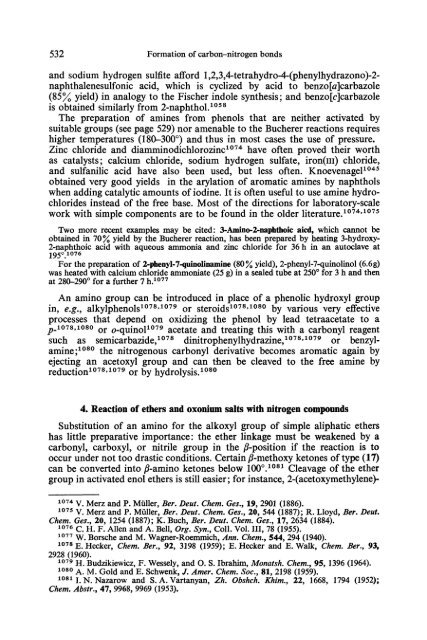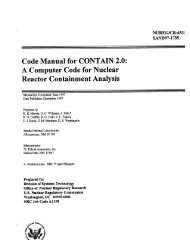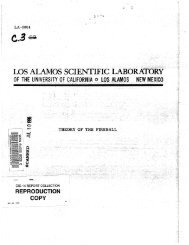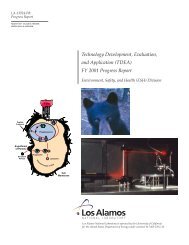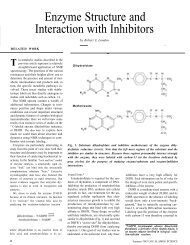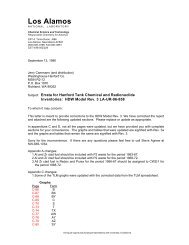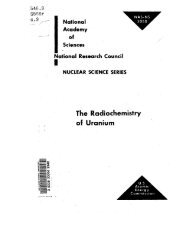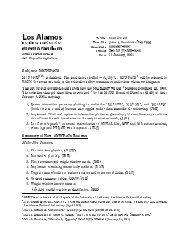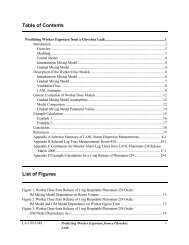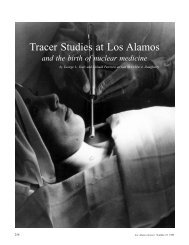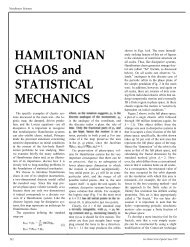- Page 1 and 2:
PREPARATIVE ORGANIC CHEMISTRY
- Page 3 and 4:
WEYGAND/HILGETAG PREPARATIVE ORGANI
- Page 5 and 6:
Foreword to the 4 th Edition The fi
- Page 7:
Summary of Contents Introduction: O
- Page 10 and 11:
X Contents II. Addition of hydrogen
- Page 12 and 13:
x ii Contents II. Replacement of ha
- Page 14 and 15:
xiv Contents II. Esters 368 1. Repl
- Page 16 and 17:
xvi Contents 1. Replacement of nitr
- Page 18 and 19:
xviii Contents 5. Cleavage of the S
- Page 20 and 21:
xx Contents Chapter 11. Formation o
- Page 22 and 23:
xxii Contents 1.3. Formation of new
- Page 24 and 25:
xxiv Contents IV. Rearrangement of
- Page 27 and 28:
Introduction: Organization of the M
- Page 29:
PART A Reactions on the Intact Carb
- Page 32 and 33:
6 Formation of carbon-hydrogen bond
- Page 34 and 35:
8 Formation of carbon-hydrogen bond
- Page 36 and 37:
10 Formation of carbon-hydrogen bon
- Page 38 and 39:
12 Formation of carbon-hydrogen bon
- Page 40 and 41:
14 Formation of carbon-hydrogen bon
- Page 42 and 43:
16 Formation of carbon-hydrogen bon
- Page 44 and 45:
18 Formation of carbon-hydrogen bon
- Page 46 and 47:
20 Formation of carbon-hydrogen bon
- Page 48 and 49:
22 Formation of carbon-hydrogen bon
- Page 50 and 51:
24 Formation of carbon-hydrogen bon
- Page 52 and 53:
26 Formation of carbon-hydrogen bon
- Page 54 and 55:
28 Formation of carbon-hydrogen bon
- Page 56 and 57:
30 Formation of carbon-hydrogen bon
- Page 58 and 59:
32 Formation of carbon-hydrogen bon
- Page 60 and 61:
34 Formation of carbon-hydrogen bon
- Page 62 and 63:
36 Formation of carbon-hydrogen bon
- Page 64 and 65:
38 Formation of carbon-hydrogen bon
- Page 66 and 67:
40 Formation of carbon-hydrogen bon
- Page 68 and 69:
42 Formation of carbon-hydrogen bon
- Page 70 and 71:
44 Formation of carbon-hydrogen bon
- Page 72 and 73:
46 Formation of carbon-hydrogen bon
- Page 74 and 75:
48 Formation of carbon-hydrogen bon
- Page 76 and 77:
50 Formation of carbon-hydrogen bon
- Page 78 and 79:
52 Formation of carbon-hydrogen bon
- Page 80 and 81:
54 Formation of carbon-hydrogen bon
- Page 82 and 83:
56 Formation of carbon-hydrogen bon
- Page 84 and 85:
58 Formation of carbon-hydrogen bon
- Page 86 and 87:
60 Formation of carbon-hydrogen bon
- Page 88 and 89:
62 Formation of carbon-hydrogen bon
- Page 90 and 91:
64 Formation of carbon-hydrogen bon
- Page 92 and 93:
66 Formation of carbon-hydrogen bon
- Page 94 and 95:
68 Formation of carbon-hydrogen bon
- Page 96 and 97:
70 Formation of carbon-hydrogen bon
- Page 98 and 99:
72 Formation of carbon-hydrogen bon
- Page 100 and 101:
74 Formation of carbon-hydrogen bon
- Page 102 and 103:
76 Formation of carbon-hydrogen bon
- Page 104 and 105:
78 Formation of carbon-hydrogen bon
- Page 106 and 107:
80 Formation of carbon-hydrogen bon
- Page 108 and 109:
82 Formation of carbon-hydrogen bon
- Page 110 and 111:
84 Formation of carbon-hydrogen bon
- Page 112 and 113:
86 Formation of carbon-deuterium bo
- Page 114 and 115:
88 Formation of carbon-deuterium bo
- Page 116 and 117:
90 Formation of carbon-deuterium bo
- Page 118 and 119:
92 Formation of carbon-deuterium bo
- Page 120 and 121:
94 Formation of carbon-deuterium bo
- Page 122 and 123:
96 Formation of carbon-deuterium bo
- Page 124 and 125:
98 Formation of carbon-deuterium bo
- Page 126 and 127:
100 Formation of carbon-deuterium b
- Page 128 and 129:
CHAPTER 3 Formation of Carbon-Halog
- Page 130 and 131:
104 Formation of carbon-halogen bon
- Page 132 and 133:
106 Formation of carbon-halogen bon
- Page 134 and 135:
108 Formation of carbon-halogen bon
- Page 136 and 137:
110 Formation of carbon-halogen bon
- Page 138 and 139:
112 Formation of carbon-halogen bon
- Page 140 and 141:
114 Formation of carbon-halogen bon
- Page 142 and 143:
116 Formation of carbon-halogen bon
- Page 144 and 145:
118 Formation of carbon-halogen bon
- Page 146 and 147:
120 Formation of carbon-halogen bon
- Page 148 and 149:
122 Formation of carbon-halogen bon
- Page 150 and 151:
124 Formation of carbon-halogen bon
- Page 152 and 153:
126 Formation of carbon-halogen bon
- Page 154 and 155:
128 Formation of carbon-halogen bon
- Page 156 and 157:
130 Formation of carbon-halogen bon
- Page 158 and 159:
132 Formation of carbon-halogen bon
- Page 160 and 161:
134 Formation of carbon-halogen bon
- Page 162 and 163:
136 Formation of carbon-halogen bon
- Page 164 and 165:
138 Formation of carbon-halogen bon
- Page 166 and 167:
140 Formation of carbon-halogen bon
- Page 168 and 169:
142 Formation of carbon-halogen bon
- Page 170 and 171:
144 Formation of carbon-halogen bon
- Page 172 and 173:
146 Formation of carbon-halogen bon
- Page 174 and 175:
148 Formation of carbon-halogen bon
- Page 176 and 177:
150 Formation of carbon-halogen bon
- Page 178 and 179:
152 Formation of carbon-halogen bon
- Page 180 and 181:
154 Formation of carbon-halogen bon
- Page 182 and 183:
156 Formation of carbon-halogen bon
- Page 184 and 185:
158 Formation of carbon-halogen bon
- Page 186 and 187:
160 Formation of carbon-halogen bon
- Page 188 and 189:
162 Formation of carbon-halogen bon
- Page 190 and 191:
164 Formation of carbon-halogen bon
- Page 192 and 193:
166 Formation of carbon-halogen bon
- Page 194 and 195:
168 Formation of carbon-halogen bon
- Page 196 and 197:
170 Formation of carbon-halogen bon
- Page 198 and 199:
172 Formation of carbon-halogen bon
- Page 200 and 201:
174 Formation of carbon-halogen bon
- Page 202 and 203:
176 Formation of carbon-halogen bon
- Page 204 and 205:
178 Formation of carbon-halogen bon
- Page 206 and 207:
180 Formation of carbon-halogen bon
- Page 208 and 209:
182 Formation of carbon-halogen bon
- Page 210 and 211:
184 Formation of carbon-halogen bon
- Page 212 and 213:
186 Formation of carbon-halogen bon
- Page 214 and 215:
188 Formation of carbon-halogen bon
- Page 216 and 217:
190 Formation of carbon-halogen bon
- Page 218 and 219:
192 Formation of carbon-halogen bon
- Page 220 and 221:
194 Formation of carbon-halogen bon
- Page 222 and 223:
196 Formation of carbon-halogen bon
- Page 224 and 225:
198 Formation of carbon-halogen bon
- Page 226 and 227:
200 Formation of carbon-halogen bon
- Page 228 and 229:
202 Formation of carbon-halogen bon
- Page 230 and 231:
204 Formation of carbon-halogen bon
- Page 232 and 233:
206 Formation of carbon-halogen bon
- Page 234 and 235:
208 Formation of carbon-halogen bon
- Page 236 and 237:
210 Formation of carbon-halogen bon
- Page 238 and 239:
212 Formation of carbon-halogen bon
- Page 240 and 241:
214 Formation of carbon-halogen bon
- Page 242 and 243:
216 Formation of carbon-halogen bon
- Page 244 and 245:
218 Formation of carbon-halogen bon
- Page 246 and 247:
220 Formation of carbon-halogen bon
- Page 248 and 249:
222 Formation of carbon-halogen bon
- Page 250 and 251:
224 Formation of carbon-halogen bon
- Page 252 and 253:
226 Formation of carbon-halogen bon
- Page 254 and 255:
228 Formation of carbon-halogen bon
- Page 256 and 257:
230 Formation of carbon-halogen bon
- Page 258 and 259:
232 Formation of carbon-halogen bon
- Page 260 and 261:
234 Formation of carbon-halogen bon
- Page 262 and 263:
236 Formation of carbon-halogen bon
- Page 264 and 265:
238 Formation of carbon-halogen bon
- Page 266 and 267:
240 Formation of c arbon-halogen bo
- Page 268 and 269:
242 Formation of carbon-halogen bon
- Page 270 and 271:
244 Formation of carbon-halogen bon
- Page 272 and 273:
246 Formation of carbon-halogen bon
- Page 274 and 275:
248 Formation of carbon-halogen bon
- Page 276 and 277:
250 Formation of carbon-halogen bon
- Page 278 and 279:
252 Formation of carbon-halogen bon
- Page 280 and 281:
254 Formation of carbon-halogen bon
- Page 282 and 283:
256 Formation of carbon-halogen bon
- Page 284 and 285:
258 Formation of carbon-halogen bon
- Page 286 and 287:
260 Formation of carbon-halogen bon
- Page 288 and 289:
262 Formation of carbon-halogen bon
- Page 290 and 291:
264 Formation of carbon-halogen bon
- Page 292 and 293:
266 Formation of carbon-halogen bon
- Page 294 and 295:
268 Formation of carbon-halogen bon
- Page 296 and 297:
270 Formation of carbon-halogen bon
- Page 298 and 299:
272 Formation of carbon-halogen bon
- Page 300 and 301:
274 Formation of carbon-oxygen bond
- Page 302 and 303:
276 Formation of carbon-oxygen bond
- Page 304 and 305:
278 Formation of carbon-oxygen bond
- Page 306 and 307:
280 Formation of carbon-oxygen bond
- Page 308 and 309:
282 Formation of carbon-oxygen bond
- Page 310 and 311:
284 Formation of carbon-oxygen bond
- Page 312 and 313:
286 Formation of carbon-oxygen bond
- Page 314 and 315:
288 Formation of carbon-oxygen bond
- Page 316 and 317:
290 Formation of carbon-oxygen bond
- Page 318 and 319:
292 Formation of carbon-oxygen bond
- Page 320 and 321:
294 Formation of carbon-oxygen bond
- Page 322 and 323:
296 Formation of carbon-oxygen bond
- Page 324 and 325:
298 Formation of carbon-oxygen bond
- Page 326 and 327:
300 Formation of carbon-oxygen bond
- Page 328 and 329:
302 Formation of carbon-oxygen bond
- Page 330 and 331:
304 Formation of carbon-oxygen bond
- Page 332 and 333:
306 Formation of carbon-oxygen bond
- Page 334 and 335:
308 Formation of carbon-oxygen bond
- Page 336 and 337:
310 Formation of carbon-oxygen bond
- Page 338 and 339:
312 Formation of carbon-oxygen bond
- Page 340 and 341:
314 Formation of carbon-oxygen bond
- Page 342 and 343:
316 Formation of carbon-oxygen bond
- Page 344 and 345:
318 Formation of carbon-oxygen bond
- Page 346 and 347:
320 Formation of carbon-oxygen bond
- Page 348 and 349:
322 Formation of carbon-oxygen bond
- Page 350 and 351:
324 Formation of carbon-oxygen bond
- Page 352 and 353:
326 Formation of carbon-oxygen bond
- Page 354 and 355:
328 Formation of carbon-oxygen bond
- Page 356 and 357:
330 Formation of carbon-oxygen bond
- Page 358 and 359:
332 Formation of carbon-oxygen bond
- Page 360 and 361:
334 Formation of carbon-oxygen bond
- Page 362 and 363:
336 Formation of carbon-oxygen bond
- Page 364 and 365:
338 Formation of carbon-oxygen bond
- Page 366 and 367:
340 Formation of carbon-oxygen bond
- Page 368 and 369:
342 Formation of carbon-oxygen bond
- Page 370 and 371:
344 Formation of carbon-oxygen bond
- Page 372 and 373:
346 Formation of carbon-oxygen bond
- Page 374 and 375:
348 Formation of carbon-oxygen bond
- Page 376 and 377:
350 Formation of carbon-oxygen bond
- Page 378 and 379:
352 Formation of carbon-oxygen bond
- Page 380 and 381:
354 Formation of carbon-oxygen bond
- Page 382 and 383:
356 Formation of carbon-oxygen bond
- Page 384 and 385:
358 Formation of carbon-oxygen bond
- Page 386 and 387:
360 Formation of carbon-oxygen bond
- Page 388 and 389:
362 Formation of carbon-oxygen bond
- Page 390 and 391:
364 Formation of carbon-oxygen bond
- Page 392 and 393:
366 Formation of carbon-oxygen bond
- Page 394 and 395:
368 Formation of carbon-oxygen bond
- Page 396 and 397:
370 Formation of carbon-oxygen bond
- Page 398 and 399:
372 Formation of carbon-oxygen bond
- Page 400 and 401:
374 Formation of carbon-oxygen bond
- Page 402 and 403:
376 Formation of carbon-oxygen bond
- Page 404 and 405:
378 Formation of carbon-oxygen bond
- Page 406 and 407:
380 Formation of carbon-oxygen bond
- Page 408 and 409:
382 Formation of carbon-oxygen bond
- Page 410 and 411:
384 Formation of carbon-oxygen bond
- Page 412 and 413:
386 Formation of carbon-oxygen bond
- Page 414 and 415:
388 Formation of carbon-oxygen bond
- Page 416 and 417:
390 Formation of carbon-oxygen bond
- Page 418 and 419:
392 Cleavage of carbon-oxygen bonds
- Page 420 and 421:
394 Cleavage of carbon-oxygen bonds
- Page 422 and 423:
396 Cleavage of carbon-oxygen bonds
- Page 424 and 425:
398 Cleavage of carbon-oxygen bonds
- Page 426 and 427:
400 Cleavage of carbon-oxygen bonds
- Page 428 and 429:
402 Cleavage of carbon-oxygen bonds
- Page 430 and 431:
CHAPTER 6 Formation of Carbon-Nitro
- Page 432 and 433:
406 Formation of carbon-nitrogen bo
- Page 434 and 435:
408 Formation of carbon-nitrogen bo
- Page 436 and 437:
410 Formation of carbon-nitrogen bo
- Page 438 and 439:
412 Formation of carbon-nitrogen bo
- Page 440 and 441:
414 Formation of carbon-nitrogen bo
- Page 442 and 443:
416 Formation of carbon-nitrogen bo
- Page 444 and 445:
418 Formation of carbon-nitrogen bo
- Page 446 and 447:
420 Formation of carbon-nitrogen bo
- Page 448 and 449:
422 Formation of carbon-nitrogen bo
- Page 450 and 451:
424 Formation of carbon-nitrogen bo
- Page 452 and 453:
426 Formation of carbon-nitrogen bo
- Page 454 and 455:
428 Formation of carbon-nitrogen bo
- Page 456 and 457:
430 Formation of carbon-nitrogen bo
- Page 458 and 459:
432 Formation of carbon-nitrogen bo
- Page 460 and 461:
434 Formation of carbon-nitrogen bo
- Page 462 and 463:
436 Formation of carbon-nitrogen bo
- Page 464 and 465:
438 Formation of carbon-nitrogen bo
- Page 466 and 467:
440 Formation of carbon-nitrogen bo
- Page 468 and 469:
442 Formation of carbon-nitrogen bo
- Page 470 and 471:
444 Formation of carbon-nitrogen bo
- Page 472 and 473:
446 Formation of carbon-nitrogen bo
- Page 474 and 475:
448 Formation of carbon-nitrogen bo
- Page 476 and 477:
450 Formation of carbon-nitrogen bo
- Page 478 and 479:
452 Formation of carbon-nitrogen bo
- Page 480 and 481:
454 Formation of carbon-nitrogen bo
- Page 482 and 483:
456 Formation of carbon-nitrogen bo
- Page 484 and 485:
458 Formation of carbon-nitrogen bo
- Page 486 and 487:
460 Formation of carbon-nitrogen bo
- Page 488 and 489:
462 Formation of carbon-nitrogen bo
- Page 490 and 491:
464 Formation of carbon-nitrogen bo
- Page 492 and 493:
466 Formation of carbon-nitrogen bo
- Page 494 and 495:
468 Formation of carbon-nitrogen bo
- Page 496 and 497:
470 Formation of carbon-nitrogen bo
- Page 498 and 499:
472 Formation of carbon-nitrogen bo
- Page 500 and 501:
474 Formation of carbon-nitrogen bo
- Page 502 and 503:
476 Formation of carbon-nitrogen bo
- Page 504 and 505:
478 Formation of carbon-nitrogen bo
- Page 506 and 507:
480 Formation of carbon-nitrogen bo
- Page 508 and 509: 482 Formation of carbon-nitrogen bo
- Page 510 and 511: 484 Formation of carbon-nitrogen bo
- Page 512 and 513: 486 Formation of carbon-nitrogen bo
- Page 514 and 515: 48 8 Formation of carbon-nitrogen b
- Page 516 and 517: 490 Formation of carbon-nitrogen bo
- Page 518 and 519: 492 Formation of carbon-nitrogen bo
- Page 520 and 521: 494 Formation of carbon-nitrogen bo
- Page 522 and 523: 496 Formation of carbon-nitrogen bo
- Page 524 and 525: 498 Formation of carbon-nitrogen bo
- Page 526 and 527: 500 Formation of carbon-nitrogen bo
- Page 528 and 529: 502 Formation of carbon-nitrogen bo
- Page 530 and 531: 504 Formation of carbon-nitrogen bo
- Page 532 and 533: 506 Formation of carbon-nitrogen bo
- Page 534 and 535: 508 Formation of carbon-nitrogen bo
- Page 536 and 537: 510 Formation of carbon-nitrogen bo
- Page 538 and 539: 512 Formation of carbon-nitrogen bo
- Page 540 and 541: 514 Formation of carbon-nitrogen bo
- Page 542 and 543: 516 Formation of carbon-nitrogen bo
- Page 544 and 545: 518 Formation of carbon-nitrogen bo
- Page 546 and 547: 520 Formation of carbon-nitrogen bo
- Page 548 and 549: 522 Formation of carbon-nitrogen bo
- Page 550 and 551: 524 Formation of carbon-nitrogen bo
- Page 552 and 553: 526 Formation of carbon-nitrogen bo
- Page 554 and 555: 528 Formation of carbon-nitrogen bo
- Page 556 and 557: 530 Formation of carbon-nitrogen bo
- Page 560 and 561: 534 Formation of carbon-nitrogen bo
- Page 562 and 563: 536 Formation of carbon-nitrogen bo
- Page 564 and 565: 538 Formation of carbon-nitrogen bo
- Page 566 and 567: 540 Formation of carbon-nitrogen bo
- Page 568 and 569: 542 Formation of carbon-nitrogen bo
- Page 570 and 571: 544 Formation of carbon-nitrogen bo
- Page 572 and 573: 546 Formation of carbon-nitrogen bo
- Page 574 and 575: 548 Formation of carbon-nitrogen bo
- Page 576 and 577: 550 Alteration of nitrogen groups i
- Page 578 and 579: 552 Alteration of nitrogen groups i
- Page 580 and 581: 554 Alteration of nitrogen groups i
- Page 582 and 583: 556 Alteration of nitrogen groups i
- Page 584 and 585: 558 Alteration of nitrogen groups i
- Page 586 and 587: 560 Alteration of nitrogen groups i
- Page 588 and 589: 562 Alteration of nitrogen groups i
- Page 590 and 591: 564 Alteration of nitrogen groups i
- Page 592 and 593: 566 Alteration of nitrogen groups i
- Page 594 and 595: 568 Alteration of nitrogen groups i
- Page 596 and 597: 570 Alteration of nitrogen groups i
- Page 598 and 599: 572 Alteration of nitrogen groups i
- Page 600 and 601: 574 Alteration of nitrogen groups i
- Page 602 and 603: 576 Alteration of nitrogen groups i
- Page 604 and 605: 578 Alteration of nitrogen groups i
- Page 606 and 607: 580 Alteration of nitrogen groups i
- Page 608 and 609:
582 Alteration of nitrogen groups i
- Page 610 and 611:
584 Alteration of nitrogen groups i
- Page 612 and 613:
586 Alteration of nitrogen groups i
- Page 614 and 615:
588 Alteration of nitrogen groups i
- Page 616 and 617:
590 Alteration of nitrogen groups i
- Page 618 and 619:
592 Alteration of nitrogen groups i
- Page 620 and 621:
594 Alteration of nitrogen groups i
- Page 622 and 623:
596 Alteration of nitrogen groups i
- Page 624 and 625:
598 Alteration of nitrogen groups i
- Page 626 and 627:
CHAPTER 8 Formation of Carbon-Sulfu
- Page 628 and 629:
602 Formation of carbon-sulfur bond
- Page 630 and 631:
604 Formation of carbon-sulfur bond
- Page 632 and 633:
606 Formation of carbon-sulfur bond
- Page 634 and 635:
608 Formation of carbon-sulfur bond
- Page 636 and 637:
610 Formation of carbon-sulfur bond
- Page 638 and 639:
612 Formation of carbon-sulfur bond
- Page 640 and 641:
614 Formation of carbon-sulfur bond
- Page 642 and 643:
616 Formation of carbon-sulfur bond
- Page 644 and 645:
618 Formation of carbon-sulfur bond
- Page 646 and 647:
620 Formation of carbon-sulfur bond
- Page 648 and 649:
622 Formation of carbon-sulfur bond
- Page 650 and 651:
624 Formation of carbon-sulfur bond
- Page 652 and 653:
626 Formation of carbon-sulfur bond
- Page 654 and 655:
628 Formation of carbon-sulfur bond
- Page 656 and 657:
630 Formation of carbon-sulfur bond
- Page 658 and 659:
632 Formation of carbon-sulfur bond
- Page 660 and 661:
634 Formation of carbon-sulfur bond
- Page 662 and 663:
636 Formation of carbon-sulfur bond
- Page 664 and 665:
638 Formation of carbon-sulfur bond
- Page 666 and 667:
640 Formation of carbon-sulfur bond
- Page 668 and 669:
642 Formation of carbon-sulfur bond
- Page 670 and 671:
644 Formation of carbon-sulfur bond
- Page 672 and 673:
646 Formation of carbon-sulfur bond
- Page 674 and 675:
648 Formation of carbon-sulfur bond
- Page 676 and 677:
650 Formation of carbon-sulfur bond
- Page 678 and 679:
652 Formation of carbon-sulfur bond
- Page 680 and 681:
654 Formation of carbon-sulfur bond
- Page 682 and 683:
656 Formation of carbon-sulfur bond
- Page 684 and 685:
658 Formation of carbon-sulfur bond
- Page 686 and 687:
660 Formation of carbon-sulfur bond
- Page 688 and 689:
662 Formation of carbon-sulfur bond
- Page 690 and 691:
664 Formation of carbon-sulfur bond
- Page 692 and 693:
666 Formation of carbon-sulfur bond
- Page 694 and 695:
668 Formation of carbon-sulfur bond
- Page 696 and 697:
670 Formation of carbon-sulfur bond
- Page 698 and 699:
672 Formation of carbon-sulfur bond
- Page 700 and 701:
674 Formation of carbon-sulfur bond
- Page 702 and 703:
676 Formation of carbon-sulfur bond
- Page 704 and 705:
678 Formation of carbon-sulfur bond
- Page 706 and 707:
680 Formation of carbon-sulfur bond
- Page 708 and 709:
682 Formation of carbon-sulfur bond
- Page 710 and 711:
684 Formation of carbon-sulfur bond
- Page 712 and 713:
686 Formation of carbon-sulfur bond
- Page 714 and 715:
688 Formation of carbon-sulfur bond
- Page 716 and 717:
690 Formation of carbon-sulfur bond
- Page 718 and 719:
692 Formation of carbon-sulfur bond
- Page 720 and 721:
694 Formation of carbon-phosphorus
- Page 722 and 723:
696 Formation of carbon-phosphorus
- Page 724 and 725:
698 Formation of carbon-phosphorus
- Page 726 and 727:
700 Formation of carbon-phosphorus
- Page 728 and 729:
702 Formation of carbon-phosphorus
- Page 730 and 731:
704 Formation of carbon-phosphorus
- Page 732 and 733:
706 Formation of carbon-phosphorus
- Page 734 and 735:
708 Formation of carbon-phosphorus
- Page 736 and 737:
710 Formation of carbon-phosphorus
- Page 738 and 739:
712 Formation of carbon-phosphorus
- Page 740 and 741:
714 Formation of carbon-phosphorus
- Page 742 and 743:
716 Formation of carbon-phosphorus
- Page 744 and 745:
718 Formation of carbon-phosphorus
- Page 746 and 747:
720 Formation of carbon-phosphorus
- Page 748 and 749:
722 Formation of carbon-phosphorus
- Page 750 and 751:
724 Formation of carbon-phosphorus
- Page 752 and 753:
726 Formation of carbon-phosphorus
- Page 754 and 755:
728 Formation of carbon-phosphorus
- Page 756 and 757:
730 Formation of carbon-phosphorus
- Page 758 and 759:
732 Formation of carbon-phosphorus
- Page 760 and 761:
734 Formation of carbon-phosphorus
- Page 762 and 763:
736 Formation of carbon-phosphorus
- Page 764 and 765:
738 Formation of carbon-phosphorus
- Page 766 and 767:
740 Formation of carbon-phosphorus
- Page 768 and 769:
742 Formation of carbon-phosphorus
- Page 770 and 771:
744 Formation of carbon-phosphorus
- Page 772 and 773:
746 Formation of carbon-phosphorus
- Page 774 and 775:
CHAPTER 10 Formation of Metal-Carbo
- Page 776 and 777:
750 Formation of metal-carbon bonds
- Page 778 and 779:
7 52 Formation of metal-carbon bond
- Page 780 and 781:
754 Formation of metal-carbon bonds
- Page 782 and 783:
756 Formation of metal-carbon bonds
- Page 784 and 785:
758 Formation of metal-carbon bonds
- Page 786 and 787:
760 Formation of metal-carbon bonds
- Page 788 and 789:
762 Formation of metal-carbon bonds
- Page 790 and 791:
764 Formation of metal-carbon bonds
- Page 792 and 793:
766 Formation of metal-carbon bonds
- Page 794 and 795:
768 Formation of metal-carbon bonds
- Page 796 and 797:
770 Formation of metal-carbon bonds
- Page 798 and 799:
772 Formation of metal-carbon bonds
- Page 800 and 801:
774 Formation of metal-carbon bonds
- Page 802 and 803:
776 Formation of metal-carbon bonds
- Page 804 and 805:
778 Formation of metal-carbon bonds
- Page 806 and 807:
780 Formation of metal-carbon bonds
- Page 808 and 809:
782 Formation of metal-carbon bonds
- Page 810 and 811:
784 Formation of metal-carbon bonds
- Page 812 and 813:
786 Formation of metal-carbon bonds
- Page 814 and 815:
788 Formation of metal-carbon bonds
- Page 816 and 817:
790 Formation of metal-carbon bonds
- Page 818 and 819:
792 Formation of metal-carbon bonds
- Page 820 and 821:
794 Formation of metal-carbon bonds
- Page 822 and 823:
796 Formation of metal-carbon bonds
- Page 824 and 825:
798 Formation of metal-carbon bonds
- Page 826 and 827:
800 Formation of metal-carbon bonds
- Page 828 and 829:
802 Formation of metal-carbon bonds
- Page 830 and 831:
804 Formation of metal-carbon bonds
- Page 832 and 833:
806 Formation of metal-carbon bonds
- Page 834 and 835:
808 Formation of metal-carbon bonds
- Page 836 and 837:
810 Formation of metal-carbon bonds
- Page 838 and 839:
812 Formation of metal-carbon bonds
- Page 840 and 841:
814 Formation of carbon-carbon mult
- Page 842 and 843:
816 Formation of carbon-carbon mult
- Page 844 and 845:
818 Formation of carbon-carbon mult
- Page 846 and 847:
820 Formation of carbon-carbon mult
- Page 848 and 849:
822 Formation of carbon-carbon mult
- Page 850 and 851:
824 Formation of carbon-carbon mult
- Page 852 and 853:
826 Formation of carbon-carbon mult
- Page 854 and 855:
828 Formation of carbon-carbon mult
- Page 856 and 857:
830 Formation of carbon-carbon mult
- Page 858 and 859:
832 Formation of carbon-carbon mult
- Page 860 and 861:
834 Formation of carbon-carbon mult
- Page 862 and 863:
836 Formation of carbon-carbon mult
- Page 864 and 865:
838 Formation of carbon-carbon mult
- Page 866 and 867:
840 Formation of carbon-carbon mult
- Page 868 and 869:
842 Formation of carbon-carbon mult
- Page 871 and 872:
PARTB Formation of new carbon-carbo
- Page 873 and 874:
Addition to C=C bonds 847 Under the
- Page 875 and 876:
Addition to C= C bonds 849 A radica
- Page 877 and 878:
Addition to C=C bonds 851 ful catal
- Page 879 and 880:
formation (b) that is necessary for
- Page 881 and 882:
Addition to C —C bonds 855 Nitril
- Page 883 and 884:
Addition to C —C bonds 857 3,6-ep
- Page 885 and 886:
Addition to C—C bonds 8 59 Stereo
- Page 887 and 888:
Addition to C=C bonds 861 6. Additi
- Page 889 and 890:
Addition to C=C bonds 863 In this c
- Page 891 and 892:
Addition to C=C bonds 865 are added
- Page 893 and 894:
Addition to C=C bonds 867 amount of
- Page 895 and 896:
Addition to the C=O bond 869 Such a
- Page 897 and 898:
Addition to the C=O bond 871 Such c
- Page 899 and 900:
Addition to the C=O bond 873 3. For
- Page 901 and 902:
Addition to the C=O bond 875 In hyd
- Page 903 and 904:
Addition to the C=O bond 877 Finely
- Page 905 and 906:
Addition to the C=O bond 879 the te
- Page 907 and 908:
Addition to the C=O bond 881 A Grig
- Page 909 and 910:
Addition to the C=O bond 883 c. Tre
- Page 911 and 912:
Addition to the C= O bond 885 The d
- Page 913 and 914:
Addition to C-N multiple bonds 887
- Page 915 and 916:
Addition to C-N multiple bonds 889
- Page 917 and 918:
Addition to C-N multiple bonds 891
- Page 919 and 920:
Addition to C-N multiple bonds 893
- Page 921 and 922:
C-C linkage by removal of hydrogen
- Page 923 and 924:
C~C linkage by removal of hydrogen
- Page 925 and 926:
C-C linkage by removal of hydrogen
- Page 927 and 928:
C-C linkage by removal of hydrogen
- Page 929 and 930:
C-C linkage by replacement of halog
- Page 931 and 932:
C-C linkage by replacement of halog
- Page 933 and 934:
C-C linkage by replacement of halog
- Page 935 and 936:
C-C linkage by replacement of halog
- Page 937 and 938:
C-C linkage by replacement of halog
- Page 939 and 940:
C-C linkage by replacement of halog
- Page 941 and 942:
C-C linkage by replacement of halog
- Page 943 and 944:
C-C linkage by replacement of halog
- Page 945 and 946:
C-C linkage by replacement of halog
- Page 947 and 948:
C-C linkage by replacement of halog
- Page 949 and 950:
C-C linkage by replacement of halog
- Page 951 and 952:
C-C linkage by replacement of halog
- Page 953 and 954:
C-C linkage by replacement of halog
- Page 955 and 956:
C-C linkage by replacement of halog
- Page 957 and 958:
C-C linkage by replacement of halog
- Page 959 and 960:
C-C linkage by replacement of halog
- Page 961 and 962:
C-C linkage by replacement of halog
- Page 963 and 964:
C-C linkage by replacement of halog
- Page 965 and 966:
C-C linkage by replacement of halog
- Page 967 and 968:
C-C linkage by replacement of halog
- Page 969 and 970:
C-C linkage by replacement of halog
- Page 971 and 972:
C-C linkage by replacement of halog
- Page 973 and 974:
C-C linkage by replacement of halog
- Page 975 and 976:
esters: 634 ' 640 ' 641 C-C linkage
- Page 977 and 978:
C-C linkage by replacement of hydro
- Page 979 and 980:
C-C linkage by replacement of hydro
- Page 981 and 982:
C-C linkage by replacement of hydro
- Page 983 and 984:
C-C linkage by replacement of hydro
- Page 985 and 986:
C-C linkage by replacement of OR by
- Page 987 and 988:
C-C linkage by replacement of OR by
- Page 989 and 990:
C-C linkage by replacement of OR by
- Page 991 and 992:
C-C linkage by replacement of O-acy
- Page 993 and 994:
C-C linkage by replacement of nitro
- Page 995 and 996:
C-C linkage by replacement of nitro
- Page 997 and 998:
C-C linkage by replacement of nitro
- Page 999 and 1000:
tions (see also page 957): C-C link
- Page 1001 and 1002:
C-C linkage by replacement of nitro
- Page 1003 and 1004:
C-C linkage by replacement of nitro
- Page 1005 and 1006:
Removal of halogen with formation o
- Page 1007 and 1008:
Formation of a new C=C bond by remo
- Page 1009 and 1010:
Formation of a new C=C bond by remo
- Page 1011 and 1012:
Formation of a new C=C bond by remo
- Page 1013 and 1014:
Formation of a new C=C bond by remo
- Page 1015 and 1016:
Formation of a new C=C bond by remo
- Page 1017 and 1018:
Formation of a new C=C bond by remo
- Page 1019 and 1020:
Formation of a new C=C bond by remo
- Page 1021 and 1022:
Removal of sulfur with formation of
- Page 1023 and 1024:
Removal of phosphorus with formatio
- Page 1025:
Removal of phosphorus with formatio
- Page 1029 and 1030:
PART C Cleavage of Carbon-Carbon Bo
- Page 1031 and 1032:
Removal of carbon dioxide 1005 Only
- Page 1033 and 1034:
Removal of carbon dioxide 1007 resp
- Page 1035 and 1036:
Removal of carbon dioxide 1009 e. N
- Page 1037 and 1038:
Removal of carbon dioxide 1011 Hydr
- Page 1039 and 1040:
Removal of carbon d ioxide 1013 Thi
- Page 1041 and 1042:
Removal of carbon d ioxide 1015 as
- Page 1043 and 1044:
Removal of carbon dioxide 1017 char
- Page 1045 and 1046:
Removal of carbon dioxide 1019 Conv
- Page 1047 and 1048:
Removal of carbon monoxide 1021 Thi
- Page 1049 and 1050:
Removal of carbon monoxide 1023 lab
- Page 1051 and 1052:
Removal of carbon monoxide 1025 It
- Page 1053 and 1054:
Removal of other fragments 1027 1.
- Page 1055 and 1056:
Removal of other fragments 1029 sol
- Page 1057 and 1058:
Removal of other fragments 1031 The
- Page 1059 and 1060:
Oxidative cleavage of C-C bonds in
- Page 1061 and 1062:
Oxidative degradation of olefins 10
- Page 1063 and 1064:
Oxidative degradation of olefins 10
- Page 1065 and 1066:
Oxidative degradation of olefins 10
- Page 1067 and 1068:
Oxidative cleavage of carbon-carbon
- Page 1069 and 1070:
Oxidative cleavage of carbon-carbon
- Page 1071 and 1072:
Oxidative degradation of aromatic a
- Page 1073 and 1074:
Hydrolytic cleavage 1047 Cleavage b
- Page 1075:
Hydrolytic cleavage 1049 Ethyl acet
- Page 1079 and 1080:
PART D Rearrangements of Carbon Com
- Page 1081 and 1082:
Migration of a multiple bond 1055 i
- Page 1083 and 1084:
Migration of a multiple bond 1057 A
- Page 1085 and 1086:
Rearrangement with change of an oxy
- Page 1087 and 1088:
Rearrangement with change of an oxy
- Page 1089 and 1090:
Rearrangement with change of an oxy
- Page 1091 and 1092:
2 hours at 250-270°, thus: 54 Rear
- Page 1093 and 1094:
Rearrangement of halogen compounds
- Page 1095 and 1096:
Migration from oxygen to carbon 106
- Page 1097 and 1098:
Migration from oxygen to carbon 107
- Page 1099 and 1100:
Migration from nitrogen to carbon 1
- Page 1101 and 1102:
Benzyl-0-tolyl rearrangement 1075 R
- Page 1103 and 1104:
Migration from carbon to nitrogen 1
- Page 1105 and 1106:
Migration from carbon to nitrogen 1
- Page 1107 and 1108:
Migration from carbon to nitrogen 1
- Page 1109 and 1110:
Wagner-Meerwein rearrangement and r
- Page 1111 and 1112:
Wagner-Meerwein rearrangement and r
- Page 1113 and 1114:
Cope rearrangement; valence isomeri
- Page 1115 and 1116:
Cope rearrangement; valence isomeri
- Page 1117 and 1118:
Rearrangement on decomposition of d
- Page 1119 and 1120:
Rearrangement on decomposition of d
- Page 1121 and 1122:
Appendix I Purification and drying
- Page 1123 and 1124:
Purification and drying of organic
- Page 1125 and 1126:
Purification and drying of organic
- Page 1127 and 1128:
Purification and drying of organic
- Page 1129 and 1130:
Preparation and purification of gas
- Page 1131 and 1132:
Preparation and purification of gas
- Page 1133 and 1134:
Preparative organic work with small
- Page 1135 and 1136:
Preparative organic work with small
- Page 1137 and 1138:
Preparative organic work with small
- Page 1139 and 1140:
Preparative organic work with small
- Page 1141 and 1142:
Preparative organic work with small
- Page 1143 and 1144:
Preparative organic work with small
- Page 1145 and 1146:
Preparative organic work with small
- Page 1147 and 1148:
Preparative organic work with small
- Page 1149 and 1150:
Preparative organic work with small
- Page 1151 and 1152:
Preparative organic work with small
- Page 1153 and 1154:
Preparative organic work with small
- Page 1155 and 1156:
SUBJECT INDEX This index deals prim
- Page 1157 and 1158:
Acetophenone, co-amino-, 451 —, b
- Page 1159 and 1160:
Aldehyde nitrates, 423 Aldehydes, a
- Page 1161 and 1162:
Amidic acids, 485 Amidines, 472 —
- Page 1163 and 1164:
Aporphine, 970 D-Arabinose, 1029
- Page 1165 and 1166:
Benzene, pentaphenyl-, 831 — ,pen
- Page 1167 and 1168:
Benzoyl chloride, 246 — —, 0-ch
- Page 1169 and 1170:
Butane, l-bromo-4-chloro-, 238 —,
- Page 1171 and 1172:
Carbodiimide, dicyclohexyl-, oxidat
- Page 1173 and 1174:
Chloromethylation, 158, 952 (Chloro
- Page 1175 and 1176:
Cyclohexanone, 2,3-epoxy-3,5,5-trim
- Page 1177 and 1178:
Diethyl ether, sulfide, 637, 653
- Page 1179 and 1180:
Ethane, 1,2-dichloro-, 107 —, 1 ,
- Page 1181 and 1182:
Formic acid, esters, decomposition,
- Page 1183 and 1184:
Heptatrienal, 7-phenyl-, 988 3-Hept
- Page 1185 and 1186:
Hydroquinones, 0-mercapto, 606 Hydr
- Page 1187 and 1188:
Ketones, (x,oc-dibromo, 191, 258
- Page 1189 and 1190:
Methane, diphenyltolyl-, 949 —, n
- Page 1191 and 1192:
l-Naphthylamines, JV-aryl-, 531, 53
- Page 1193 and 1194:
Oxazole, 5-ethoxy-2-phenyl-, 858 Ox
- Page 1195 and 1196:
Phenyl azide, 584 — isocyanate, 4
- Page 1197 and 1198:
Propane, l,2,3-trichloro-2-methyl-,
- Page 1199 and 1200:
2,6-Pyridinediamine, 443 3,5-Pyridi
- Page 1201 and 1202:
Silane, trichloro(chloromethyl)-, 7
- Page 1203 and 1204:
Sulfoxides, 630, 667, 668 —, redu
- Page 1205 and 1206:
Thiouronium salts, 692 , S-cyclohex
- Page 1207:
Valence isomerization, 1088 Valeral


